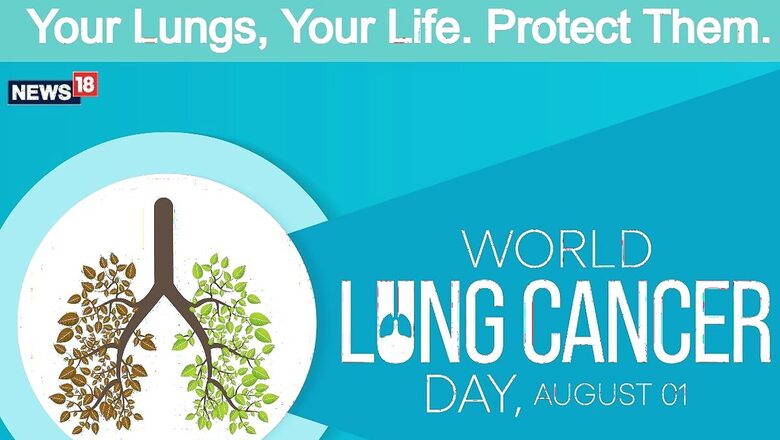
views
Cancer arises when abnormal cells multiply uncontrollably, leading to the formation of tumors and invasion of normal tissues. In addition to genetic causes, various factors such as radiation exposure, toxic chemicals, and tobacco smoke can result in these mutations. Chronic infections, certain hormones, immunological disorders, and lifestyle choices like obesity, inactivity, and poor diet are other contributing factors. Dr Manoj Kutteri – CEO & Medical Director, Atmantan Wellness Centre takes us through the signs and symptoms of lung cancer.
Among the many types of cancer, the most common ones include skin, colorectal, prostate, lung, and breast cancers. Lung cancer is a leading cause of cancer-related deaths worldwide and is strongly linked to smoking. The symptoms, risk factors, and treatments for each type of cancer vary, highlighting the importance of early detection and personalized care. Although smoking is the main cause, lung cancer can also affect non-smokers due to inherited traits, radon gas exposure, asbestos exposure, or air pollution. There are two primary types of lung cancer: non-small cell lung cancer (NSCLC) and small cell lung cancer (SCLC), each with different behaviors, prognoses, and treatments.
- SmokingThe majority of lung cancer cases are caused by smoking, which is the primary cause of the disease. The risk is significantly increased by both active smoking and exposure to second-hand smoke.
- Radon GasThis naturally occurring radioactive gas can accumulate in homes and buildings, increasing the risk of lung cancer.
- Asbestos ExposureOccupational exposure to asbestos fibers is a known risk factor.
- Genetic FactorsA family history of lung cancer can increase risk.
- Air PollutionLong-term exposure to polluted air may raise the risk of lung cancer.
- Prior Radiation TherapyReceiving radiation therapy to the chest can elevate the risk of lung cancer.Many symptoms of lung cancer can be easily mistaken for other, less severe medical conditions, leading to delays in seeking early treatment.Breathlessness: If fluid accumulates around the lungs or a tumor obstructs or narrows an airway, breathlessness can occur. It is often misdiagnosed as chronic obstructive pulmonary disease (COPD), asthma, insufficient physical activity, or even obesity.
Persistent CoughA persistent cough that either does not go away or worsens over time is one of the most common signs of lung cancer. It is frequently misdiagnosed as an allergy, cold, bronchitis, or flu-related cough.
Chest Pain
Continuous pain that worsens when you breathe deeply, cough, or laugh can indicate lung cancer. Such chest pain can also be due to musculoskeletal issues like costochondritis, pleurisy, heart problems, or referred pain from digestive system disorders.
Coughing Up Blood
Even small amounts of blood in sputum can indicate lung cancer, although this serious symptom usually raises concern. It is often overlooked as a minor respiratory infection or bronchitis.
Fatigue
Excessive fatigue or weakness can be caused by numerous illnesses, including lung cancer. It is often linked to anemia, insomnia, chronic fatigue syndrome, myalgia, or a sedentary lifestyle.
Hoarseness
When a tumor presses against or invades the recurrent laryngeal nerve, hoarseness of voice can occur. This can be mistaken for benign conditions like a cold, voice strain, laryngitis, or thyroid problems. Persistent or unexplained hoarseness lasting more than a few weeks should be evaluated as it could be an early sign of lung cancer.
Recurrent Lung Infections
Lung cancer can be indicated by recurrent infections such as pneumonia or bronchitis. These infections are often misdiagnosed as typical respiratory ailments, lowered immunity, or viral or bacterial infections.
Loss of Appetite and Unexplained Weight Loss
Sudden or unexplained weight loss can be indicators of various diseases, including lung cancer. Individuals may attribute this to stomach problems, stress, depression, or anxiety.
Swelling in the Face or Neck
Swelling in the face or neck can occur if a tumor presses on the superior vena cava, the major vein carrying blood from the upper body to the heart. This is sometimes mistaken for allergic reactions, insect bites, or other less serious problems.
Maintaining a healthy lifestyle is crucial to preventing lung cancer. Quitting smoking is the most effective measure since smoking is the primary cause of lung cancer. Avoiding exposure to second-hand smoke is also vital. Regular physical activity promotes general health and reduces cancer risk, and a nutritious diet rich in fruits and vegetables can enhance lung health. Reducing exposure to known carcinogens in homes or workplaces, such as asbestos and radon gas, is also important. Additional lung protection can be achieved by limiting alcohol intake and avoiding pollution. These lifestyle choices are essential for lowering lung cancer risk and improving long-term health.




















Comments
0 comment